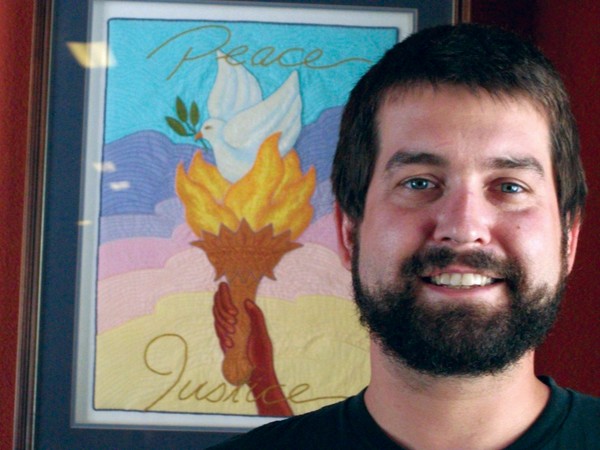
Jacob Flowers
After 10 years, Flowers is leaving his post of executive director.
The Mid-South Peace & Justice Center has been a part of Jacob Flowers’ life for as long as he can remember.
Flowers, who leaves his executive director post at the end of the month, oversaw the social justice nonprofit for 10 years. But Flowers’ parents volunteered with the Peace & Justice Center in the ’80s, when he just a kid. He remembers his mom’s work on the Central American Task Force and his dad helping out with Nuclear Freeze Movement protests.
Flowers interned at the center in high school and, after college, began working for the organization full-time. As executive director, he was responsible for helping bring the struggling center into a more financially stable position. And he oversaw many campaigns aimed at everything from protesting the Iraq War to fighting for better local homeless services to launching community gardens.
At the end of the month, he’s leaving the position to take on a new role as the Tennessee State Director for Enroll America, a national organization with a focus on boosting the numbers of people enrolled in affordable health care.
— Bianca Phillips
Flyer: Did you get to witness your parents doing peace work?
Flowers: My mom was involved with work around the Central American Crisis and the Sanctuary Movement, which was kin to an underground railroad for the U.S.-sponsored violence in Central America. Her leg was to pick people [from Central America] up from Brownsville and bring them to Memphis. I didn’t get to go with her, but I grew up knowing a lot of these families and a lot of these kids. We had Spanish lessons at one family’s house.
I remember seeing my father [who was involved in the Nuclear Freeze Movement] arrested for sitting on the train tracks by Channel 3 and blocking a train carrying nuclear weapons from going through our city. Watching two police officers carry him off is an early memory.
How did you end up as the executive director?
I ended up interning here in 2001. I helped start the Orange Mound Community Garden that summer. When I got out of college, I spent time living in Western Massachusetts and looking for a job where I could do this kind of work professionally. Either I could take a baseline level organizing position [somewhere else] or I could go home and help rebuild the Peace & Justice Center, which at the time, in 2003 to 2004, was in a pretty bad financial spot. We didn’t have a paid staff at the time. The board was managing all the programs.
Under your leadership, what have you been the most proud of?
The opportunity that we had to refocus the organization around critical local issues, in addition to focusing on national and international-level issues, is what I treasure the most about my time here — all of those local campaigns that weren’t a part of the political discourse at the time, like homelessness, that we made into central issues that we are focusing on in our city.
What will you miss the most?
Oh man, I’m gonna miss lots of stuff. I’ll miss the great leaders and staff that I have had the privilege to work with. But at the same time, it’s been a real privilege to get paid to do this kind of work. I’m giving up that privilege, but I’ll still be heavily involved as a community member.
What’s next for the Peace & Justice Center?
Part of having a strong, sustainable, people-led organization is letting leadership cycle, so we’re moving up some of our internal leaders. For right now, we can announce that Brad Watkins will be the executive director beginning June 1st.
And you have turned your leaving into a fundraiser, right?
One of the last things I’m doing is trying to raise money for the organization. We’ve launched a 10 for 10 campaign. For my 10 years of service, I’m trying to raise $10,000 to move us strongly through the end of the year. Anyone can donate at midsouthpeace.org/tenforten